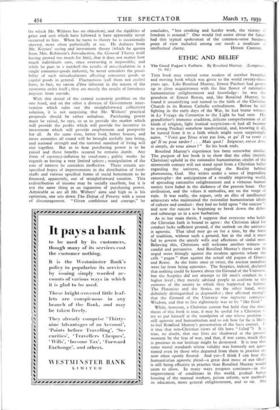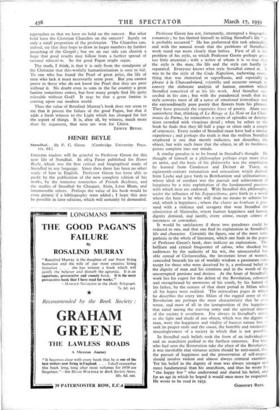ETHIC AND BELIEF
This book may remind some readers of another beautiful and moving book which was given to the world twenty-three years ago. Like Rosalind Murray, Ernest Psichari had grown up in close acquaintance with the fine flower of rationalist humanitarian enlightenment and knowledge : he was the grandson of Ernest Renan, and, like Rosalind Murray, he found it unsatisfying and turned to the faith of the Christian Church in its Roman Catholic embodiment. Before he fell fighting in the early days of the War, he had borne witness in Le Voyage du Centurion to the Light he had seen His grandfather's immense erudition, delicate comprehension of all kinds of religion, light ironical scepticism—it had all become to young Psichari somehow insubstantial, and, knowing it all, he turned from it to a faith which might seem surprisingly " Voici que Jesus n'est pas loin, et qu' II va venir et qu' Il ne peut tarder ! . . . Mais quoi ! Seigneur, est-ce done si simple, de vous aimer ?" So his book ends.
Rosalind Murray's experience has been somewhat similar. The purport of her book is to show that the ethic (mainly Christian) upheld in the rationalist humanitarian circles of the nineteenth century will not stand apart from a Christian belief regarding the universe, regarding the Reality behind phenomena, God. She writes under a sense of impending catastrophe : the anticipations of a steadily improving world, of spreading rationalist enlightenment and a virtuous human society have faded in the darkness of the present hour. Our civilisation, and the values it embodies, are on the verge of ruin. It was really, she argues, only an elite of intellectual aristocrats who maintained the rationalist humanitarian ideals of culture and conduct : they had no hold upon " the outcast "; and now the outcast is beginning to break down the dykes and submerge us in a new barbarism.
As to her main thesis, I suppose that everyone who holds the Christian faith is bound to agree: the Christian ideal for conduct lacks sufficient ground, if the outlook on the universe is agnostic. That ideal may go on for a time, by the force of tradition, without such a ground, but in the end it must fail to govern the unruly wills and affections of sinful men. Believing this, Christians will welcome another witness so candid and persuasive. And Rosalind Murray's thesis can be urged more fittingly against the modern agnostic whom she calls " pagan " than against the actual old pagans of Greece and Rome. As she hints once or twice, the ancient moralists were far from being agnostics. The Sceptics, indeed, declared that nothing could be known about the Ground of the Universe. but the Sceptics did not attempt to lift men's conduct to a higher level ; they merely advised people to conform to the customs of the society to which they happened to belong. The Platonists and the Stoics, on the other hand, were definitely distinguished as dogmatikoi ; they affirmed strongly that the Ground of the Universe was supreme consciou- Wisdom, and that to live righteously was to be " like God...
While, however, a Christian cannot but hold that the mai.: thesis of this book is true, it may be useful for a Christian Et, try to put himself at the standpoint of one whose position i- still agnostic and humanitarian and to ask how far he is likely to feel Rosalind Murray's presentation of the facts correct. l- it true that non-Christian views of life have " failed "? It 1- true, no doubt, that our lives are shadowed at the present moment by the fear of war, and that, if war came, much that is precious in our heritage might be destroyed. It is true that some moral standards whose validity was formerly not ques- tioned even by those who departed from them in practice are now often openly flouted. And yet—I think I can hear the humanitarian agnostic plead—a great deal more of our ideal', is still being effective in practice than Rosalind Murray would seem to allow. In many ways progress continues—in the improvement of conditions in this world, gradual better housing of the manual workers, prison reform, new methods in education, more general enlightenment, and so on. She
reproaches us that we have no hold on the outcast. But what hold have the Christian Churches on the outcast? Surely on only a small proportion of the proletariat. The Churches can, indeed, say that they hope to draw in larger numbers by further preaching of the Gospel ; but we on our side can cherish a hope that good results may follow from a further spread of rational educati-m. So the good Pagan might argue.
The truth, I think, is that it is only from the standpoint of the Christian that this-worldly humanitarianism is seen to fail. To one who has found the Pearl of great price, the life of men who lack it must necessarily seem poor. But you cannot prove to those who do not know the Pearl that they are poor without it. No doubt even to sons in the far country a great famine sometimes comes, but how many people find life quite tolerable without God? It may be that a great famine is coming upon our modern world.
Thus the value of Rosalind Murray's book does not seem to me that it proves the failure of the good Pagan, but that it adds a fresh witness to the Light which has changed for her the aspect of things. It is, after all, by witness, much more than by argument, that men are won for Christ.
EDWYN BEVAN.











































 Previous page
Previous page